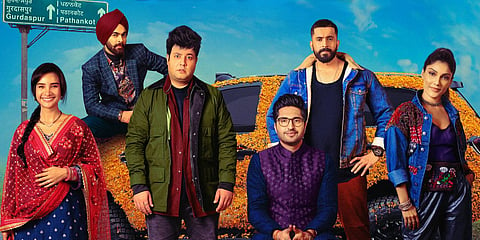Wild Wild Punjab Movie Review: This Varun Sharma-Sunny Singh road-trip is woefully cranky
Wild Wild Punjab(1.5 / 5)
Imagine a comic going up on stage and recounting ‘that’ crazy experience he had with his eccentric group of friends. He introduces each one of them with a quirky anecdote; there’s mention of casual hook-up experiences and exaggerated breakups. Only, it’s not as funnier or edgier. Set-up, punchlines, and callbacks follow in order to elicit laughs, but the audience is already squirming in its seat. Wild Wild Punjab is that stand-up comedy piece made into a film.
The scenes here act more like standalone jokes than as part of a cohesive narrative. The character arc of the protagonist, Rajesh Khanna, aka Khanne, is in itself a long joke spread across the plot. Khanne has been cheated on by his girlfriend, Vaishali, leaving him in disarray. His friends, Maan Arora (Sunny Singh) and Gaurav Jain (Jassie Gill), suggest that in order to find closure, Khanne should let her know that he has moved on. Along with Honey Singh (Manjot Singh), who has a car, they plan to gatecrash Vaishali’s wedding, which is supposed to take place in a few hours in Pathankot. Their journey, however, is stuffed further with shorter jokes, digressing the plot into mostly unrelated scenarios, including an extended sequence of a mistaken wedding between Gaurav and Radha (Patralekhaa). It tries to be a desi Hangover (2009) through outlandish humour but only ends up being Indra Kumar’s Dhamaal (2007), minus all the fun.
The friends here lack the necessary chemistry needed to feel connected with them and their struggles. Their kinship feels more like a coincidence. No viewer would say that they are friends or continue to be so even after the film ends. It becomes difficult to ascertain who they are as people. What does this road trip mean for them? The premise starts to feel stretched as there is little change happening to the characters in successive sequences. They face adversities, they react, and they conquer it all without eliciting any reaction from the viewer. If anything, it almost makes you believe that all male friendships are, in fact, crass and shallow.
Wild Wild Punjab is produced by Luv Ranjan, and as with any of his films, the main antagonists are women. It becomes concerning how the female characters in this film function. Vaishali is portrayed as an obnoxious cheater. Khanne used to lovingly call her ‘Vaishu,’ which gives a free license to the writers to create several instances where Khanne’s friends refer to her as ‘Vaishya (prostitute)’ instead. Even Radha makes the same 'mistake’ on one occasion as she advises Khanne that he needs to look more ‘wicked’ if he is supposed to gate-crash the wedding of his ex. Radha’s own wedding to a visibly inebriated Gaurav is neither funny nor reflective, as it is meant to be, but reeks only of regressivity. She is shown to be lacking any agency. If Vaishali is a manipulative and untrustworthy person, Radha is more of a traditionalist without a clear conscience. Another extreme is the vape-smoking Meera (Ishita Raj), who is introduced as a brash college-going student as she beats up a boy for stealing her money. Among the three, the makers seem to be the most judgmental towards Vaishali and Meera, while empathising with the ‘ideal woman’ in Radha. In a patriarchal world, controlling the desires and actions of women is the only outcome, and the film seems to inherently champion it.
If that is not enough, there are crude, objectifying remarks made by characters time and again. Explaining Khanne’s angst for his ex to a cop, Maan asks him to imagine a hypothetical situation. When the cop is able to relate to it, he says, “Apni cheez koi dusra le jaaye to bura to lagega (If someone takes away your thing, it is bound to make you feel bad).” The seriousness with which this plays out is almost disturbing to see, as the actors try to make it seem amusing. Sunny Singh operates mostly on autopilot as the unidimensional Maan, who is the epitome of casual sexism. Varun Sharma becomes overly loud in his scenes as he fails to bring any emotional impact or comic relief. Even Manjot Singh struggles to find the right tone in his performance.
Films like Wild Wild Punjab don’t usually become a practice for understanding misogyny but rather invisibilising it through casual situational comedy. The industry catchphrase 'make it relatable’ takes a rather skewed turn when problematic character traits are meant to be validated by men watching it on-screen. If looked at critically, the film makes for a strong case against uncontrolled masculinity and the myriad ways in which it can manifest in men. What happens in Punjab shouldn’t stay in Punjab after all.

